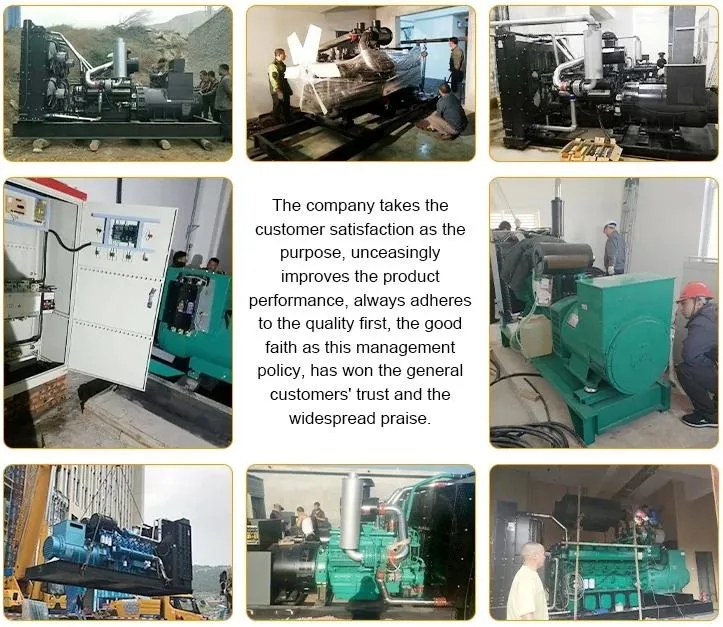Introduction
In today's modern world, electricity has become an integral part of our daily lives. From powering our homes to driving industries, the demand for electricity continues to grow. As the demand for electricity increases, so does the need for a stable and reliable power supply. One key aspect of ensuring grid stability and reliability is the management of reactive power. Reactive power is essential for maintaining voltage levels within acceptable limits and ensuring the efficient operation of power systems. In this article, we will explore the role of diesel generators in providing reactive power support, their benefits, and challenges, and their contribution to enhancing grid stability and reliability.
Understanding Reactive Power
Reactive power is the component of electricity that establishes and maintains the electric and magnetic fields of alternating current (AC) systems. Unlike active power, which does actual work, reactive power does not perform any physical work but is essential for the operation of power systems. Reactive power is measured in units called volt-amperes reactive (VARs) and is denoted by the symbol Q. In an AC system, both active power (real power denoted by P) and reactive power are transmitted together. The combination of active and reactive power is known as apparent power (denoted by S) and is measured in units of volt-amperes (VA).
200kw diesel generator for remote communication towers plays a crucial role in maintaining voltage levels within acceptable limits, especially in transmission and distribution systems. When there is an imbalance between the generation and consumption of reactive power, voltage fluctuations can occur, leading to voltage instability and potential equipment damage. To ensure the efficient and reliable operation of power systems, utilities must manage reactive power effectively.
Role of Diesel Generators in Providing Reactive Power Support
Diesel generators are commonly used in power generation applications where reliability, flexibility, and fast response times are essential. While diesel generators are primarily designed to provide active power during grid outages or peak demand periods, they can also contribute to the provision of reactive power support. Diesel generators can be equipped with synchronous generators that have the capability to produce both active and reactive power.
When connected to the grid, diesel generators can operate in parallel with the utility grid and supply reactive power to help regulate voltage levels. By adjusting the excitation of the generator, operators can control the amount of reactive power injected into the grid to maintain voltage stability. Diesel generators can provide reactive power support in both grid-connected and islanded microgrid configurations, making them a versatile solution for enhancing grid stability.
Benefits of Using Diesel Generators for Reactive Power Support
1. Fast Response Time: Diesel generators are known for their ability to start up quickly and ramp up to full capacity within minutes. This fast response time makes them well-suited for providing reactive power support during sudden voltage fluctuations or system disturbances.
2. Reliability: Diesel generators are highly reliable sources of power, capable of operating continuously for extended periods. Their robust design and simplicity make them a dependable option for reactive power support, especially in remote or off-grid locations.
3. Flexibility: Diesel generators offer flexibility in terms of deployment and operation. They can be easily integrated into existing power systems and can be dispatched as needed to provide reactive power support where and when it is required.
4. Cost-Effectiveness: Diesel generators can offer cost-effective solutions for reactive power support, particularly in areas where grid infrastructure is limited or where renewable energy sources may not be sufficient to meet reactive power requirements.
Challenges and Limitations of Using Diesel Generators for Reactive Power Support
While diesel generators offer several benefits for providing reactive power support, there are also challenges and limitations associated with their use:
1. Fuel Dependence: Diesel generators rely on fossil fuels such as diesel oil for operation. The dependence on fossil fuels can lead to concerns related to fuel availability, price volatility, and environmental impact.
2. Emissions: Diesel generators produce emissions such as nitrogen oxides (NOx), particulate matter, and carbon dioxide (CO2) during operation. These emissions can contribute to air pollution and climate change, raising environmental concerns.

3. Maintenance Requirements: Diesel generators require regular maintenance to ensure optimal performance and reliability. Maintenance activities such as fueling, oil changes, and filter replacements can add to the operational costs of diesel generators.
4. Noise and Vibration: Diesel generators are known for their noise and vibration levels during operation. In urban or residential areas, noise pollution from diesel generators can be a concern, requiring soundproofing measures to mitigate the impact.
5. Limited Scalability: While diesel generators are suitable for providing reactive power support in smaller-scale applications, their scalability may be limited in larger power systems. In such cases, alternative solutions such as synchronous condensers or static VAR compensators (SVCs) may be more appropriate.
Conclusion
Diesel generators play a vital role in providing reactive power support to enhance grid stability and reliability. By supplying reactive power to regulate voltage levels, diesel generators help ensure the efficient operation of power systems, especially during periods of high demand or system disturbances. While diesel generators offer benefits such as fast response times, reliability, and flexibility, there are also challenges and limitations associated with their use, including fuel dependence, emissions, maintenance requirements, noise, and scalability issues.
As the energy landscape continues to evolve, advancements in technology and the integration of renewable energy sources are reshaping the way reactive power support is provided. While diesel generators will continue to play a significant role in reactive power provision, utilities and grid operators are exploring alternative solutions such as energy storage systems, FACTS devices, and smart grid technologies to enhance grid stability and reliability. By leveraging a mix of traditional and innovative solutions, the power industry can meet the growing demand for electricity while ensuring a sustainable and resilient energy future.

0no comments yet